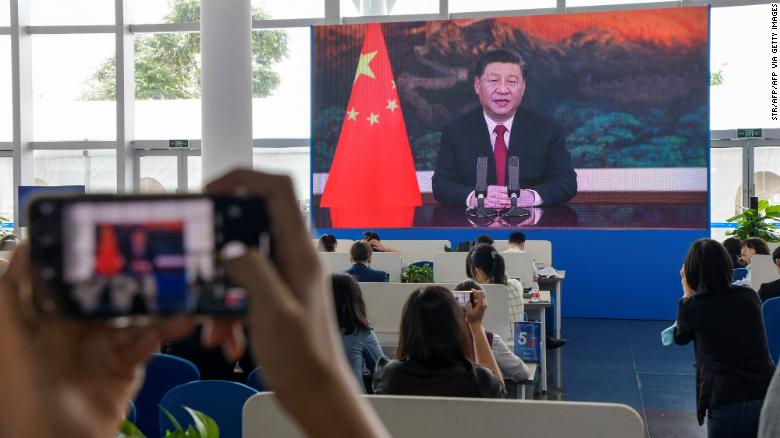By Nectar Gan and James Griffiths
Hong Kong (CNN)As much as China may want to promote its domestically-produced Covid-19 vaccines, it has to face reality.
Last month, Beijing issued a new policy making it easier for foreigners to apply for a visa to China if they had received a Chinese vaccine -- raising concerns among experts, who warned it risked setting a dangerous precedent which could leave the world separated into vaccine silos.
There was also a practical problem: in many countries, including the United States, it is impossible to get a Chinese vaccine because they have not been approved for use by regulators.
With about half of adults in the US having received at least one Covid-19 shot, many travelers eligible to enter China -- either Chinese citizens or foreigners who managed to obtain a visa -- were left unsure whether the vaccine they received would be deemed sufficient to travel to China.
This confusion was fed by the fact Chinese officials and state media have been openly critical of foreign vaccines, particularly the mRNA-based shots primarily used in the US, exaggerating their alleged risks and boosting conspiracies in an apparent attempt to shore up support for China-made vaccines.
China's embassy in Washington finally provided some clarity in a recent statement, outlining what tests travelers to China who have received one of the US-approved vaccines -- Pfizer-BioNTech, Moderna and Johnson & Johnson -- should get in order to be approved to enter the country.
With China largely back to business and infection rates low, it is likely many will soon attempt that process, particularly as the number of vaccinated continues to rise in the US.
Last month, China launched its own version of a vaccine passport, the International Travel Health Certificate (ITHC), to enable immunized people to travel more freely. The country is also moving in the direction of approving more vaccines, including foreign-made ones, which would make it easier for Chinese living overseas and foreigners hoping to travel to China to sign up to the ITHC.
According to the Wall Street Journal, Chinese officials have been scrutinizing clinical-trial data for the Pfizer-BioNTech vaccine, which could be approved for domestic use before July.
The Global Times, a state-owned newspaper, quoted the head of the Chinese Vaccine Industry Association as saying China's approval "would showcase its caring" for expats who "wanted some foreign-made vaccines for easier recognition when they return home."
And approving the BioNTech vaccine, which has an impressive efficacy of 97%, could also aid China in improving immunity levels among its own population, amid some concern about the relative low efficacy of domestic vaccines and supply shortages.
With the Pfizer-BioNTech shot among those attacked by China's propaganda organs, however, approving it may take more than mere scientific sign-off, and it remains to be seen how much damage the criticism has had in terms of undermining the Chinese public's confidence in foreign vaccines.

Chinese President Xi Jinping delivers a speech by video link during the Boao Forum for Asia in south China's Hainan province on April 20.
The business of China: Xi takes aim at bossy foreigners
Chinese President Xi Jinping this week called for global cooperation in the face of a growing anti-China front led by the United States, and warned that an "open world economy" is essential to recovering from the coronavirus pandemic.
"Attempts to erect walls or decouple run counter to the law of economics and market principles," Xi said Tuesday via video at China's Boao Forum for Asia. "They would hurt others' interests without benefiting oneself."
"We must not let the rules set by one or a few countries be imposed on others, or allow unilateralism pursued by certain countries to set the pace for the whole world," Xi added.
While Xi did not name any country during his speech — top Chinese leaders usually do not name and shame — his remarks seemed like a veiled criticism of the United States, which has stepped up pressure on China in recent months.
Last month, the US and its allies condemned Beijing and imposed coordinated sanctions against Chinese officials over alleged repression of Uyghur Muslims and other ethnic minorities in Xinjiang province. Most of the harsh sanctions the Trump administration imposed on some of China's most prominent technology companies remain in place, and trade tensions continue under the Biden administration.
"Bossing others around or meddling in others' internal affairs would not get one any support," Xi said at the forum, which was attended by thousands of executives and political leaders.
Some of America's biggest entrepreneurs and investors participated in the event as they try to navigate the tumultuous relationship between the world's top two economies. Blackstone's Stephen Schwarzman and Ray Dalio, the billionaire founder of the world's largest hedge fund, took part in a panel Monday night, according to the organizers. Apple CEO Tim Cook and Tesla CEO Elon Musk are also expected to attend.
No comments:
Post a Comment